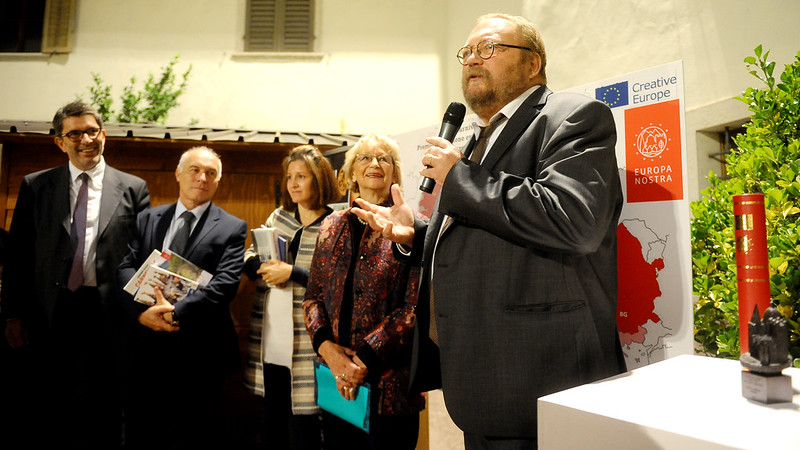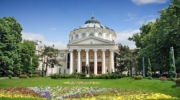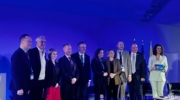Italy: Ceremony for Carnival King of Europe project assembles 300 people
Some 300 people gathered to celebrate the success of the research project Carnival King of Europe in the EU Prize for Cultural Heritage / Europa Nostra Awards 2017 on the evening of 29 September at the Trentino Folklife Museum in San Michele all’Adige in Italy. The Museum, which is located in the cloisters of the old Augustinian Provostry, was the initiator of the Carnival King of Europe project in 2007 and has been its main driving force ever since. Europa Nostra was represented by it Vice-President Irina Subotic.
Through extensive ethnographic fieldwork, cinematic documentation and travelling exhibitions, the Carnival King of Europe project, a partnership of 9 European ethnographic museums, aimed to shed new light on the similarities that can be found in the winter carnival masquerades which occur across Europe. The project aimed to unearth the common roots of these festivities and to establish evidence of their striking parallels.
The Vice-President of Europa Nostra Irina Subotic gave a most inspiring speech, highlighting the specific value of the Carnival King of Europe project for its “scientific completeness, excellent documentation, the amount of publications in specialised journals, and especially for the award-winning book ‘Carnival King of Europe’ by Giovanni Kezich, and still for so many exhibitions, conferences, educational activities, for the setting of the website and a film already awarded with a Grand Prix in Kyoto”.
“Two factors complement the value of this project: the first is its European dimension in the documentation of nearly 100 winter carnivals throughout Italy, the Balkans and Central Europe to the Iberian peninsula. The second factor is represented by its results, which show that so many of these rituals can be referred to the very essence of European culture – at least when it comes to the special and archaic relationship that links it to the issues of agriculture and fertility,” noted the Vice-President of Europa Nostra.
High-level representatives from the local political community, namely Senator Franco Panizza, Dr. Walter Viola, Chairman of the Council of the Autonomous Province of Trento, Paola Matonti, President of the Trentino Folklife Museum, and Clelia Sandri, Mayor of San Michele all’Adige, participated in the event, which took place during the Michaelmas celebrations.
The project’s specific outlook was also testified by some representatives of the local masquerades of the region, the Lachè of Romeno in Nonsberg and the Wüdelen of the Südtiroler Unterland, and by some of its most qualified witnesses from a selected cluster of important ethnographic museums: from Croatia, Zviezdana Antoš of the Etnografski Muzej Zagreb; from Poland, Amudena Rutkowska of the Państwowe Muzeum Etnograficzne of Warsaw; from Macedonia, Vladimir Bocev of the Nacionalna Ustanova Muzej of Skopje; from Austria, Herlinde Medardi, Past Director of the Tiroler Volksunstmuseum in Innsbruck; and from Italy, Giovanni Kezich, the Director of Trentino Folklife Museum, who has been, the project’s main author and initiator, with the invaluable help of his deputy Antonella Mott.
Celebrations continued with the traditional Augustinian Dinner. Every year the Michaelmas table, in the Museum cloisters, sits some 300 people for a reunion of fraternity between the local and the Museum communities, enlivened this year by the music of La Vecchia Mitraglia.








